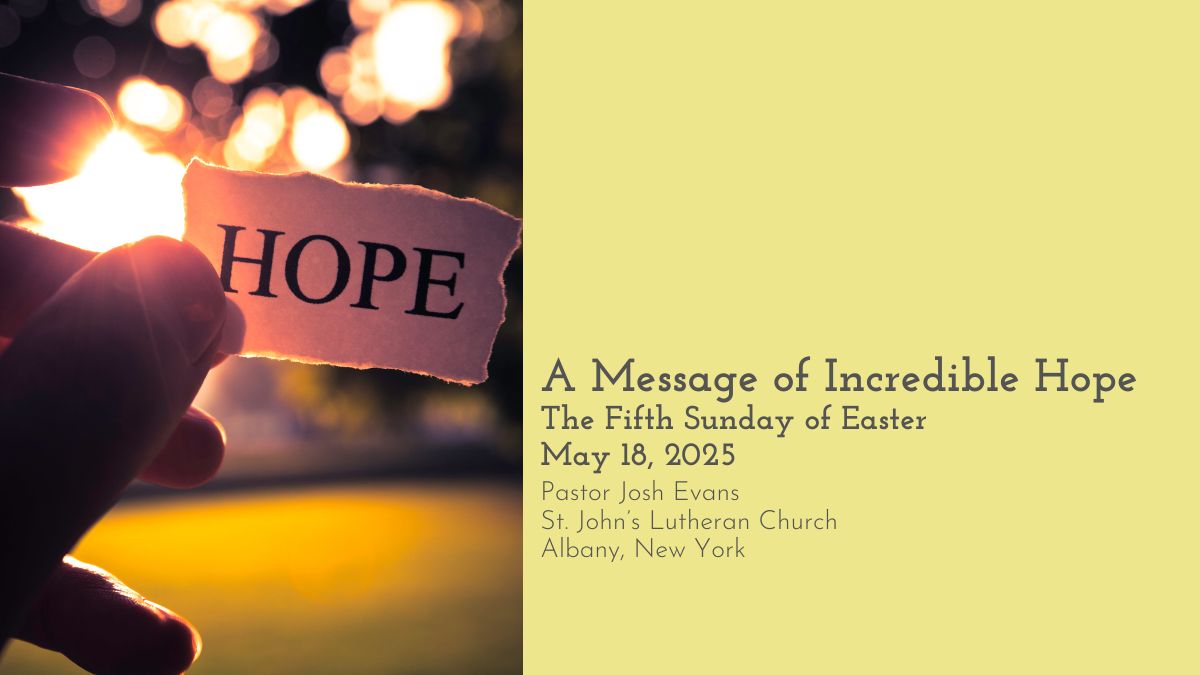St. John’s Lutheran Church
18 May 2025 + Easter 5c
Revelation 21:1-6
The Rev. Josh Evans
So, last week, I lied.
Well, sort of.
It is true that Revelation is a message of hope.
Incredible hope, in fact.
And…it is also true that maybe Revelation is a little scary…
or maybe a lot scary.
There are some undeniably terrifying images
buried in the middle chapters of this book,
in between the fluffy little lamb and its cute little scroll
and the beginning of this glorious image of the new Jerusalem.
Dragons and beasts,
war and plagues,
blood and fire.
Fortunately, we don’t get any of that
in the Revised Common Lectionary during Eastertide Year C…
or ever…
but maybe we should.
Now, of course, as vivid and as terrifying as these images are,
it is important to remember that they are symbolic.
Revelation is not a blueprint for the end of the world,
nor is it meant to be taken literally. (Let me say that again…)
But…in its vivid, attention-grabbing imagery,
it is meant to be taken seriously.
I would suggest we need the scenes of cosmic battle
to understand what is at stake,
to confront head-on the evils of empire and to expose it for what it is,
and to bring us at last to the triumphant conclusion
of the victory of the Lamb and the journey into the new Jerusalem.
As one pastor and theologian observes:
“Revelation earns its happy ending by dwelling at length on the evil that is inflicted upon the earth. It doesn’t duck or deny evil, though it also isn’t interested in giving evil more attention than it already claims. This book is more sophisticated than people assume; it knows that you end up worshipping what you stare at, so to stare at too much evil lures you into evil’s way of thinking and acting. Yet pretending like it’s not there makes you easy prey.” [1]
A theologian of the cross calls a thing what it is,
as Luther famously put it, and if that’s the case,
John of Patmos, the writer of these admittedly terrifying words,
must be a theologian of the cross:
confronting evil head-on and naming it for what it is.
A theologian of the cross also places God
squarely in the midst of suffering –
on the cross –
in solidarity with the oppressed,
alongside those who cry out under unjust systems.
“See, the home of God is among mortals,”
the apocalypse writer declares at last.
“God will dwell with them;
they will be his peoples,
and God herself will be with them and be their God;
God will wipe every tear from their eyes.”
There is repetition here, far more emphatic and intentional in the Greek:
God is with us.
God will dwell with us.
God will be with us.
And speaking of Greek, this “home” or “dwelling” is σκηνή.
This is the tent of meeting that contained God’s very presence
in the wilderness after the exodus from Egypt.
As if to reinforce for Revelation’s first-century hearers:
This is where God is,
as surely as God was with your ancestors.
“The tent of God is among mortals, God will tent with them,”
one translator puts it. [2]
Or as another biblical scholar suggests,
underscoring God’s place with the oppressed
and marginalized peoples of our world:
“God will camp among and with the people as God did after the escape from oppression in Egypt. In the modern world, where millions of people are forced to live in camp settings because of being displaced from houses due to war, natural disaster, lack of affordable housing, among other reasons, God camping with God’s people is a powerful image.” [3]
Perhaps even more powerful still is Revelation’s profound reminder
that we have a God who weeps
and is with those who weep,
who sits alongside us for every ugly cry
and who wipes away every last tear.
Lord knows there was plenty of cause for weeping
among John’s original audience,
living under the oppressive regime of Rome.
Lord knows there is plenty of cause for weeping
here and now,
as our planet and its people experience
unrelenting disasters, war, and violence,
as we experience our own anxious fears closer to home,
which we know all too well.
It is true that Revelation and the world in which it was written is scary.
Revelation doesn’t deny that
or try to move on too quickly from the discomfort,
but it meets us in the tears.
It is also true that Revelation doesn’t leave us there,
but offers us a message of incredible hope.
Our Lamb has conquered.
Our God is with us.
Our God – the Word made flesh – camps with us.
Our God, who himself weeps at the tomb of his friend Lazarus,
wipes away every tear from our eyes.
That’s the remarkable thing about Revelation:
This is not future prophecy.
This is reinforcement of what already is true:
Our risen Jesus
has destroyed the power of death,
and daily renews us in the waters of baptism –
the water of life.
Our Lamb has conquered,
and indeed is making all things new.
[1] Preaching on Revelation in Easter (Year C) – Working Preacher from Luther Seminary. Emphasis mine.
[2] Commentary on Revelation 21:1-6 – Working Preacher from Luther Seminary
[3] Lynn R. Huber and Gail R. O’Day, Revelation, Wisdom Commentary Series Book 58, p. 552. Kindle Edition. Emphasis mine.



